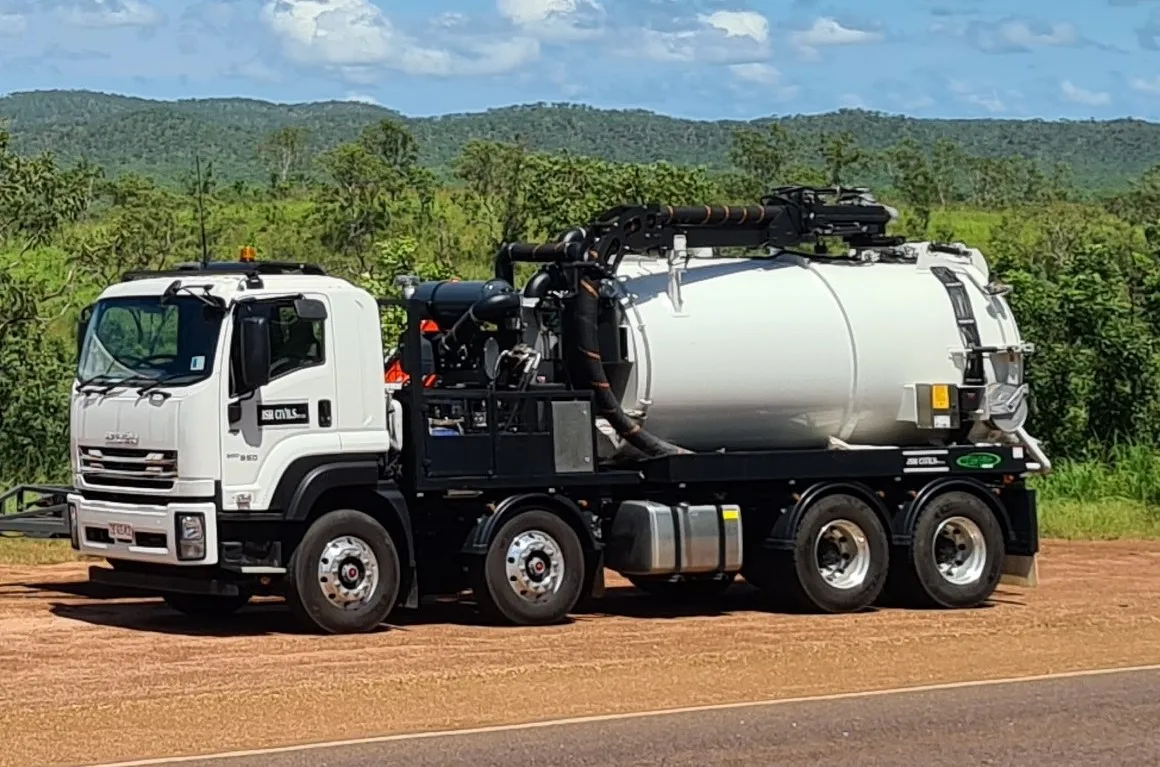Now Also operating from our new yard in Alice Springs. Our address is 3/31 Elder Street Ciccone 0870.
Safeguarding Sensitive Sites: Innovative Hydro Excavation Solutions for Darwin Projects
August 20, 2025
At JSM Civil, we know that working on sensitive or critical infrastructure in Darwin demands more than just standard excavation; it requires precision, safety, and efficiency. From the bustling streets of the CBD to industrial zones and heritage sites, traditional excavation methods often come with high risks: accidental utility strikes, ground destabilisation, environmental damage, and costly project delays.
That’s why we specialise in hydro excavation, a modern, technology-driven method that combines high-pressure water with vacuum suction to remove soil safely and efficiently. This approach gives our team unparalleled control, allowing us to work around critical infrastructure with minimal disruption.
Hydro excavation is particularly effective in Darwin, where tropical climate, varied soils, and strict regulatory requirements demand a flexible and reliable excavation method. In this article, we’ll explain why hydro excavation is the preferred solution for sensitive sites, how we adapt it to Darwin’s unique conditions, and the cost and environmental advantages it brings.

When it comes to critical infrastructure: telecommunications networks, power lines, gas pipelines, and water systems, mistakes can be extremely costly and disruptive. Hydro excavation provides a safer, more controlled alternative to traditional digging, making it the go-to choice for sensitive sites in Darwin.
At JSM Civil, safety and risk management are central to every project. Hydro excavation allows us to:
For example, when exposing telecommunications conduits in Darwin’s CBD, hydro excavation allowed us to carefully reveal cables without interrupting services to local businesses—a level of control traditional excavation simply cannot achieve.
Darwin’s tropical climate, seasonal rainfall, and diverse soil types present unique challenges that demand experience and adaptability. At JSM Civil, we tailor our hydro excavation methods to overcome these conditions, ensuring projects remain efficient, safe, and on schedule, rain or shine.
Darwin’s soils range from soft coastal sand to clay-rich inland deposits and rocky substrates. Each type requires careful handling, and hydro excavation gives us the precision to manage them all:
On a recent industrial project in Darwin, our team used hydro excavation to expose a network of high-voltage cables and fibre-optic lines. By carefully controlling water pressure and vacuum suction, we completed the excavation safely, protecting both the infrastructure and our crew, with zero disruption to nearby operations.
Hydro excavation doesn’t just improve safety—it also provides tangible cost savings and environmental benefits.
Traditional mechanical excavation often leads to extensive site restoration, adding time and expense to projects. Hydro excavation reduces these costs by:
For example, during water main repairs in Darwin, hydro excavation cut the project timeline nearly in half compared to traditional digging, with minimal restoration needed.
At JSM Civil, sustainability is embedded in our approach. Hydro excavation supports environmentally responsible construction by:
By integrating these sustainable practices, JSM Civil helps clients deliver projects that are both environmentally responsible and cost-effective.
Hydro excavation is more than just a technique—it’s a strategic approach to safeguarding sensitive sites, improving safety, and delivering efficient, cost-effective outcomes. With JSM Civil, you gain:
Hydro excavation is the safest, most efficient, and environmentally responsible way to manage sensitive sites in Darwin. By leveraging this technology, JSM Civil protects infrastructure, reduces risks, accelerates timelines, and minimises environmental impact, ensuring the best possible outcome for our clients.
For your next critical infrastructure project in Darwin, contact JSM Civil today. Let us demonstrate how our hydro excavation solutions deliver precision, safety, and efficiency—without compromise.
